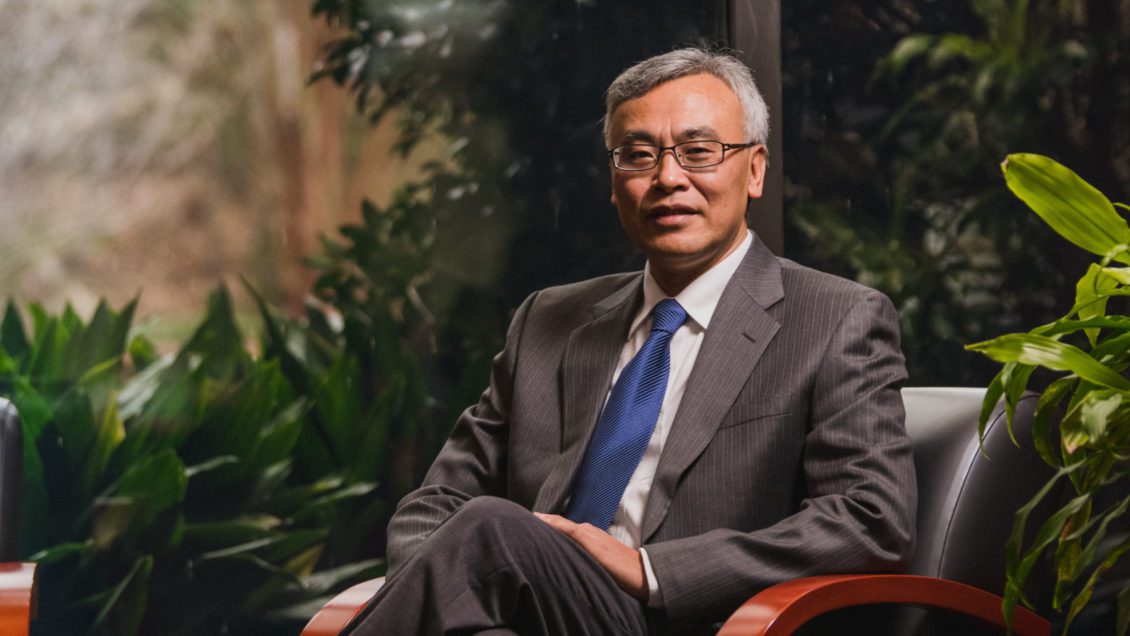A Clemson University professor who has been celebrated for bringing together colleagues for big research projects is taking the helm of the Holcombe Department of Electrical and Computer Engineering.
Hai Xiao will serve as the department’s interim chair, replacing Daniel Noneaker, who recently stepped down to serve as associate dean for research in the College of Engineering, Computing and Applied Sciences.

As chair, Xiao will oversee teaching, research and service in one of Clemson’s largest departments, the academic home of 700 students, 37 faculty members and 11 staff members. The department reported $9.8 million in research expenditures last fiscal year, the highest in the college.
“My experiences have prepared me to be a constructive contributor, effective collaborator, patient listener and caring leader,” Xiao said. “Dan has done a fantastic job. I thank him for his leadership, and I look forward to building on his success.”
Xiao, whose appointment takes effect March 16, joined Clemson in 2013 as the Samuel Lewis Bell Distinguished Professor in Electrical and Computer Engineering. He has played a leading role in helping Clemson stake a claim as a national leader in developing new technology for extreme environments.
Anand Gramopadhye, the college’s dean, thanked Noneaker for his years of leadership as the previous chair of the department and for positioning the department on a path to success. He said that Xiao is well positioned to take the reins of the department.
“Dr. Xiao is an exemplary scholar, researcher and team-builder with deep experience in collaborating across disciplines for maximum impact,” Gramopadhye said. “I congratulate him and look forward to working with him in his new role.”
Noneaker said the department will be in good hands with Xiao as chair.
“Dr. Xiao’s accomplishments as a researcher and educator are remarkable, and he has been a role model in his level of collaboration across the campus,” Noneaker said. “I am pleased that he has decided to take on the role of department chair and look forward to seeing his contributions in moving the department and our college to the next level.”
Xiao’s elevation to department chair comes on the heels of a successful fall semester.
He announced in October that he is serving as principal investigator on three research projects to develop sensors that can withstand the intense heat of power plants and the tremendous pressure at the bottom of hydraulic fracturing wells. The U.S. Department of Energy is providing the bulk of the funding for the research in three separate grants totaling $5.5 million.
He has collaborated with faculty members from many departments across the campus.
A significant part of the new research is conducted by a group of collaborators Xiao began assembling when he arrived at Clemson. The group has grown to about seven faculty members and calls itself the Clemson University Center for Intelligent Systems for Extreme Environments (CU-ISEE).
In addition to conducting research in sensors for harsh environments, the group is working on design, processing, modeling and manufacturing of advanced materials, devices and systems for harsh-environment applications.
Led by Jianhua Tong, associate professor of materials science and engineering, the group has recently received two multi-million dollar projects from the Department of Energy to develop advanced electrolyzers, fuel cells, batteries and membrane reactors.
The group received some recognition in October when two members, Xiao and Associate Professor Fei Peng, received the college’s Collaboration Award in recognition of their advanced-manufacturing research.
Xiao received his Ph.D. in electrical engineering from Virginia Polytechnic Institute and State University. Prior to joining Clemson, he was an electrical engineering professor at Missouri University of Science and Technology.
His primary research interests are in photonic and microwave sensors and instrumentation for applications in energy, intelligent infrastructure, clean environment, biomedical sensing and imaging, and national security.
Xiao has co-authored over 300 technical papers and participated in 43 research projects. He has worked on several collaborative research projects in the past 10 years, and his share of funding has come to $15 million from various sources, including federal agencies, national laboratories and private companies.
Get in touch and we will connect you with the author or another expert.
Or email us at news@clemson.edu

